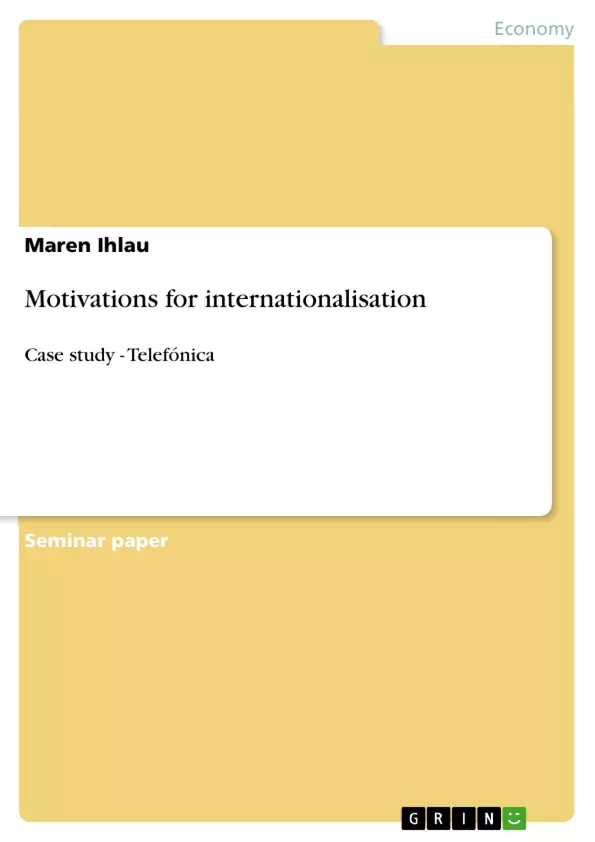With the increased importance of multinational enterprise in modern industry there has been pressure on telecommunication organisations to follow the trend in foreign direct investment (FDI). Telefónica S.A. currently ranks fourth globally in terms of profit and second in terms of number of customers with operations spanning over five continents. This report investigates Telefónica's motivations for FDI, applying conceptual frameworks developed by leading management theorists. We will focus briefly on the motivations firms face to move away from a home market and then expand on the pull factors, drawing firms to new countries and markets.
Inhaltsverzeichnis (Table of Contents)
- Motivations for Internationalisation
- Home Market Push Factors
- The Eclectic Paradigm
- Natural Resource Seeking Motives:
- Market-Seeking Motives:
- Efficiency Seeking Motives:
- Strategic Asset Seeking Investment Motives
- Horizontal FDI, Vertical FDI and the Knowledge-Capital model
Zielsetzung und Themenschwerpunkte (Objectives and Key Themes)
This report explores the motivations behind Telefónica's foreign direct investment (FDI) strategy, utilizing frameworks developed by leading management theorists. The report examines the factors that compelled Telefónica to expand beyond its home market in Spain and analyzes the pull factors that attracted the company to new countries and markets.
- Home market push factors
- The Eclectic Paradigm and its application to Telefónica's FDI
- Different types of FDI motives: natural resource seeking, market seeking, efficiency seeking, and strategic asset seeking
- The Knowledge-Capital model and its relevance to Telefónica's horizontal expansion
- The impact of Telefónica's FDI strategy on its competitive position and global reach
Zusammenfassung der Kapitel (Chapter Summaries)
The report begins by outlining the home market push factors that propelled Telefónica toward international investment. This includes the deregulation of the telecommunications industry in Europe, the privatization of Telefónica, and the company's dominant position in the Spanish market, which ultimately led to the need for new markets.
The Eclectic Paradigm, developed by John Dunning, is then introduced as a comprehensive framework for understanding FDI. This paradigm identifies three key advantages: ownership, location, and internalization, which are further explored in the context of Telefónica's FDI strategy.
The report then examines the four types of FDI motives outlined by Dunning and Rugman, with a particular focus on how they apply to Telefónica's investment decisions. These include natural resource seeking, market seeking, efficiency seeking, and strategic asset seeking.
Finally, the report discusses the Knowledge-Capital model, which provides a further analysis of the motivations behind vertical and horizontal integration. It explores how Telefónica's horizontal expansion strategy enabled the company to benefit from scale economies, knowledge sharing, and local market knowledge.
Schlüsselwörter (Keywords)
Telefónica, foreign direct investment (FDI), internationalisation, eclectic paradigm, OLI framework, ownership advantage, location advantage, internalization advantage, natural resource seeking, market seeking, efficiency seeking, strategic asset seeking, horizontal FDI, vertical FDI, Knowledge-Capital model, telecommunications industry, deregulation, privatization, competitive advantage.
Frequently Asked Questions
What are the main motivations for Telefónica's international expansion?
Motivations include home market push factors like deregulation and privatization in Spain, as well as pull factors like market-seeking and strategic asset-seeking in new countries.
What is the Eclectic Paradigm in the context of FDI?
Developed by John Dunning, it is a framework (OLI) that explains foreign direct investment based on Ownership, Location, and Internalization advantages.
What is the difference between horizontal and vertical FDI?
The report discusses these types of FDI, focusing on how Telefónica used horizontal expansion to benefit from scale economies and knowledge sharing.
How does the Knowledge-Capital model apply to Telefónica?
The model analyzes motivations for integration, showing how Telefónica leveraged its scale and local market knowledge for global growth.
What specific FDI motives are analyzed in this report?
The report categorizes motives into four types: natural resource seeking, market seeking, efficiency seeking, and strategic asset seeking.
- Quote paper
- Maren Ihlau (Author), 2008, Motivations for internationalisation , Munich, GRIN Verlag, https://www.grin.com/document/160410



